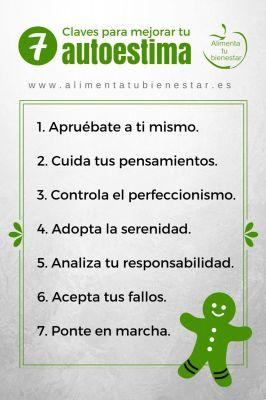
Self-esteem is essential in life. Fortunately it is not innate. Increasing your self-esteem is possible and you can start today. Find out how!
Self-esteem is the confidence and opinion we have about ourselves. We all have times when we feel a little down or have a hard time believing in ourselves. However, if this situation continues in the long term, it can create problems, such as anxiety and depression. For this you have to treat, nurture and increase self-esteem.
Self-esteem is often the result of a lifetime of experiences, and in particular what happened to us as children. However, it is possible to increase self-esteem at any age. In this article you will find more information about how self-esteem works and some actions you can take to improve it.
understanding self esteem
Some people think that self-esteem is an inner voice that tells you if you are good enough to do or achieve something.
Self-esteem is actually how we evaluate ourselves, it represents the set of our perceptions of who we are and what we are capable of.
Self-esteem is not a matter of ability
Self-esteem is often associated neither with your abilities nor with the perception that others have of you.
Those who are very good at what they do may have low self-esteem. On the contrary, a person who struggles in certain areas of life can generally have good self-esteem.
- people with one good self esteem yes they generally feel positive about themselves and life. This makes them much more resilience and better able to cope with the ups and downs of life.
- those with low self-esteeminstead, they are often much more critical of themselves. They find it more difficult to recover from a failure or a difficult situation. This can lead them to avoid difficult situations. However, doing so can further lower their self-esteem, because no matter how safe you play, the difficulties will still be there and they will feel even worse about themselves as a result.
Therefore, a lack of self-esteem can affect people's behavior, not to mention what they get out of their life.
Why do people have low self-esteem?
"Believe in yourself. The only people who appreciate a doormat are the ones with dirty shoes."
Leo BuscagliaThere are many reasons why someone may have low self-esteem. However, it often begins in childhood, when there is often a feeling of not living up to expectations. It can also be the result of adult experiences such as a difficult relationship, either personal or in the workplace.
Victims of violence and abuse often have low self-esteem. This is because the abused is often convinced that he has deserved all this, and therefore does not feel good about himself. He feels that he is not up to the task, that he is worthless, a failure, and therefore develops low self-esteem.
Sometimes a vicious circle is created: a person with low self-esteem is more likely to be mistreated without rebelling, further losing self-confidence and therefore becoming more vulnerable.
No one should be subjected to abuse or violence. If you or someone you know is in this situation, you should ask for help:
- Azzurro Telephone: for children and adolescents living in situations of abuse and deprivation
- Pink Phone: help women victims of violence and abuse
- 1522 Anti-Violence and Stalking Number: responds to requests for help and support from women who are victims of violence and harassment
- Guide for men who suffer violence: written by the psychologist and lawyer Erika Salonia, for all those adult men who suffer psychological and physical abuse. Unfortunately, we have not found any association dedicated to helping them.
Stressful life events, such as divorce or bereavement, can also have negative effects on self-esteem.
How to increase your self-esteem
There are several ways to improve your self-esteem.
1. Identify and question your negative beliefs
The first step is to identify and then question your negative beliefs about yourself.
Notice the thoughts you have about yourself. For example, you might think "I'm not smart enough to do this" or "I don't have any friends." When you do, look for evidence that contradicts these claims. Write down statements and evidence and keep looking at them to remind yourself that your negative beliefs about yourself No. are real
2. Identify what is good about you
It's also a good idea to write down your positive aspects, like being good at a sport or the nice things people have said about you. When you start to feel depressed, look at these things and remind yourself that there is much good in you.
In general, a positive self-talk is essential to increase self-esteem.
If you find yourself thinking things like "I'm not good enough" or "I'm a failure," you should definitely start turning things around by saying "I can achieve my goals" and "I can be more confident if I achieve. I just want to."
At first, you will fall back into old negative habits, but with regular effort you can begin to feel more positive and improve your self-esteem as well.
3. Build positive relationships and avoid negative ones
You are likely to find that there are certain people, and certain relationships, that make you feel better than others.
If there are people who make you feel bad about yourself, try to avoid them.
Build relationships with positive people who make you feel good about yourself. Avoid relationships that drag you down.
4. Take a breath
You don't have to be perfect every hour of every day. You don't even have to feel good about yourself all the time.
Self-esteem varies from situation to situation, day to day, and hour to hour. Some people feel relaxed and positive around friends and colleagues, but awkward and shy around strangers. Others feel totally in control of themselves at work, but struggle to socialize (or vice versa).
Take a break. We all have times when we feel a little down or find it more difficult to maintain our confidence.
The key is not to be too hard on yourself. Be kind to yourself and not too critical.
Avoid criticizing yourself in front of others, as this can reinforce your negative opinions and also give others a negative and unrealistic opinion of you.
You can help boost your self-esteem by giving yourself a little pleasure every time you manage to accomplish something difficult, or just to better handle a particularly bad day.
5. Be more assertive and learn to say no
People with low self-esteem often have a hard time standing up for themselves or saying no to others.
This means that they may be overloaded at home or at work, because they don't feel like they are denying anyone anything. However, this can increase stress and make it even more difficult to manage.
Therefore, developing assertiveness can help improve self-esteem. Sometimes acting like you believe in yourself can help boost your self-esteem.
You should definitely read our article: Learn to say no: how, when and why
6. Improve your physical health
It's much easier to feel good about yourself when you're fit and healthy.
However, people with low self-esteem often neglect themselves because they don't feel like they "deserve" to be taken care of.
Try to exercise more, eat right, and get enough sleep. It's also a good idea to find time to relax and do something you want to do, rather than something someone else expects you to do. You may find that simple changes like this can make a big difference to your overall vision.
7. Meet the challenges
People with low self-esteem often avoid difficult and challenging situations.
One way to improve your self-esteem can be to face a challenge. This doesn't mean you have to do everything yourself; Part of the challenge may be seeking help when you need it, but be prepared to try something that will be difficult to achieve.
If you can, show yourself that you can do it.
This questions your negative beliefs and therefore will improve your self-esteem.
Learn how to set effective personal goals and find the motivation to achieve them. This is the essence of personal development, a set of skills designed to help you reach your full potential, at work, in study and in personal life.
The importance of small steps
It is highly unlikely that you will go from low self-esteem to high self-esteem overnight.
Instead, you'll likely find yourself making small improvements over a period of time. The key is to look at the long term, rather than the immediate tomorrow, and focus on the big picture, not the detail of how you felt yesterday at a particular time.
When you feel good, or do something good, take a moment to cheer and celebrate, but don't get discouraged if you slip back into negative thought patterns from time to time. Recover yourself and try to think positive. Over time, this will become a habit and you will find that your self-esteem has increased considerably.
They may be interested in:
- How to increase oxygen in the blood.
- How to increase immunity and get sick less
- Learn to say no: how, when and why
- Exercises to increase the buttocks: the 7 most effective
- How to make friends: 10 tips to socialize well
- Hard truth: the 100 lessons you learn as you age


























